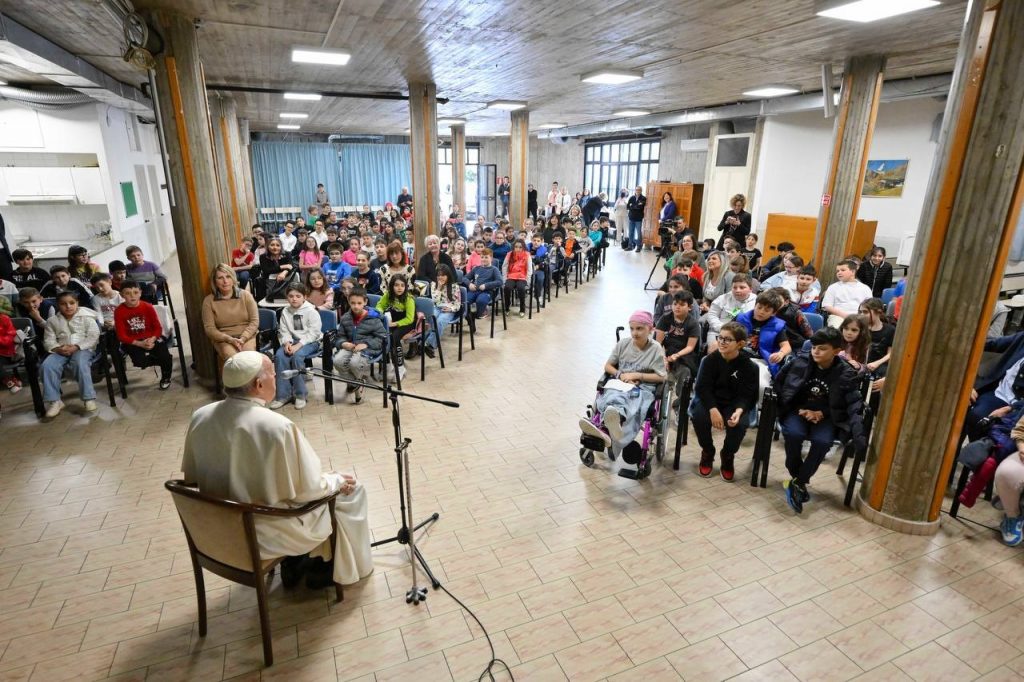(ZENIT News / Rome, 11.04.2024).- On Thursday afternoon, April 11, 2024, Pope Francis met with some 200 children of the Saint John Mary Vianney parish on the outskirts of Rome. It was the first appointment of the “School of Prayer” desired by the Holy Father, on the occasion of the Year of Prayer. The meeting was held following the experience of the “Fridays of Mercy,” in which the Pontiff met with specific categories of people without prior notice.
The children, who were part of the group of catechesis preparing for their First Communion, welcomed the Pope joyfully, who came by surprise to the community. The children were astonished when they saw the Pope come into the parish hall, together with the catechists who taught them every week.
The Holy Father catechized the children for about an hour. Responding to their questions, he gave a brief catechesis on thanksgiving prayer, stressing that it is one of the most important in Christian life. “It’s important to give thanks for everything. For instance, if you enter a person’s home and don’t say thank you, you don’t greet him, is that good? The first word is ‘thank you’; instead, the second is ‘permission,’” he said to the children of the Borghesiana suburb, in the diocese’s eastern sector.
“The third word is ‘sorry,’ continued the Holy Father. Is a person good who never says I’m sorry? It’s difficult to apologize. Sometimes shame and pride arise. But it’s important when one slips to say sorry. Three words: thanks, permission, sorry.”

Then the Pope asked the children: But, do you pray? How do you pray? What can you say to the Lord?” One of the children mentioned that his family prays before eating. “He said something important,” said the Pope, “but do you know that many children have no food? Do I thank God for giving me food? Do I thank Him for giving me a family?”
The last question touched upon the subject of faith. “But, are you Christians? Do you have faith? Let’s say it together,” said the Pope: “Thank you, Lord, for giving me faith.”
One of the most emotive questions in the conversation was that of Alice, 10 years old. “How can I thank the Lord in sickness?” The Pope answered: “Even in dark moments we must thank the Lord, because He gives us the patience to endure the difficulties. Let’s say together: ‘Thank you, Lord, for giving us the strength to endure pain.’” Other little ones asked why there is death and loneliness.
Sophia, instead, who will receive her First Communion in a few days, is very shocked by the news of the wars, and she asked the Pope how one can say “thank you” in such a tragic time. ”We must always give thanks at all times. I’ll give you some advice,” said the Pontiff by way of conclusion: “Before going to bed, think: what can I thank the Lord for today? Give thanks.”
At the end of the meeting, the children recited a “Payer of Thanksgiving” with the Pope, composed for the occasion, which will remain as a memory of an extraordinary moment in their lives.
Before leaving, the Holy Father greeted and joked with the children and gave each of them a chocolate egg. He gave the priests and some twenty catechists the first six small volumes, published in the series “Notes on Prayer,” which are aids conceived by the First Section of the Dicastery for Evangelization, to support communities’ pastoral life, in the journey of rediscovery of the centrality of prayer, in preparation for the 2025 Jubilee.
Thank you for reading our content. If you would like to receive ZENIT’s daily e-mail news, you can subscribe for free through this link.



